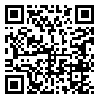Tue, Feb 3, 2026
Volume 29, Issue 4 (9-2019)
JHNM 2019, 29(4): 243-251 |
Back to browse issues page
Download citation:
BibTeX | RIS | EndNote | Medlars | ProCite | Reference Manager | RefWorks
Send citation to:



BibTeX | RIS | EndNote | Medlars | ProCite | Reference Manager | RefWorks
Send citation to:
Shaali M, Farajzadegan Z, Turk Nezhad Azerbaijani A, Boroumandfar Z. Self-efficacy and Self-esteem in Wives With Addicted Husbands. JHNM 2019; 29 (4) :243-251
URL: http://hnmj.gums.ac.ir/article-1-994-en.html
URL: http://hnmj.gums.ac.ir/article-1-994-en.html
1- Midwifery(MSc), Student Research Committee, School of Nursing and Midwifery, Isfahan University of Medical Sciences, Isfahan, Iran.
2- Associate Professor, Department of Community Medicine, School of Medicine, Isfahan University of Medical Sciences, Isfahan, Iran.
3- Psychiatrist, Imperial College London, England.
4- Assistant Professor, Department of Reproductive Health and Midwifery, School of Nursing and Midwifery, Nursing and Midwifery Care Research Center, Isfahan University of Medical Sciences, Isfahan, Iran. ,boroumandfar@nm.mui.ac.ir
2- Associate Professor, Department of Community Medicine, School of Medicine, Isfahan University of Medical Sciences, Isfahan, Iran.
3- Psychiatrist, Imperial College London, England.
4- Assistant Professor, Department of Reproductive Health and Midwifery, School of Nursing and Midwifery, Nursing and Midwifery Care Research Center, Isfahan University of Medical Sciences, Isfahan, Iran. ,
Abstract: (3402 Views)
Introduction: Husband’s addiction often leads to the disruption of family roles and duties. In this process, women as wives in families with addicted husbands may tolerate pressures from everywhere and are emotionally, physically, mentally, and behaviorally at risk.
Objective: Armed with a qualitative approach, the present study tries to recognize the nature of the problem, defines and investigates this phenomenon deeply and describe the self-efficacy and self-esteem of the women with drug addict husbands.
Materials and Methods: This study was a qualitative study using content analysis method. The data gathering process consisted of 20 semi-structured interviews with women who referred to social support centers in Isfahan City, Iran. The sampling was done by purposive sampling method until data saturation. The obtained data were analyzed using qualitative content analysis method.
Results: According to the results of the data analysis, 16 subcategories and 4 main categories, including “glass roof”, “from injury to relief”, “hope for empowerment”, and “silent victim” were extracted.
Conclusion: The results of the present study indicate that the wives of addicted men have a low level of self-efficacy and self-esteem; thus, they require supportive attention and counseling of psychologists. Since women play an essential role in the formation of a family, authorities should adequately know about their mental and psychological problems and support them concerning their husband’s addiction.
Objective: Armed with a qualitative approach, the present study tries to recognize the nature of the problem, defines and investigates this phenomenon deeply and describe the self-efficacy and self-esteem of the women with drug addict husbands.
Materials and Methods: This study was a qualitative study using content analysis method. The data gathering process consisted of 20 semi-structured interviews with women who referred to social support centers in Isfahan City, Iran. The sampling was done by purposive sampling method until data saturation. The obtained data were analyzed using qualitative content analysis method.
Results: According to the results of the data analysis, 16 subcategories and 4 main categories, including “glass roof”, “from injury to relief”, “hope for empowerment”, and “silent victim” were extracted.
Conclusion: The results of the present study indicate that the wives of addicted men have a low level of self-efficacy and self-esteem; thus, they require supportive attention and counseling of psychologists. Since women play an essential role in the formation of a family, authorities should adequately know about their mental and psychological problems and support them concerning their husband’s addiction.
Article Type : Research |
Subject:
General
Received: 2019/08/2 | Accepted: 2019/09/10 | Published: 2019/10/1
Received: 2019/08/2 | Accepted: 2019/09/10 | Published: 2019/10/1
Send email to the article author
| Rights and permissions | |
 | This work is licensed under a Creative Commons Attribution-NonCommercial 4.0 International License. |






